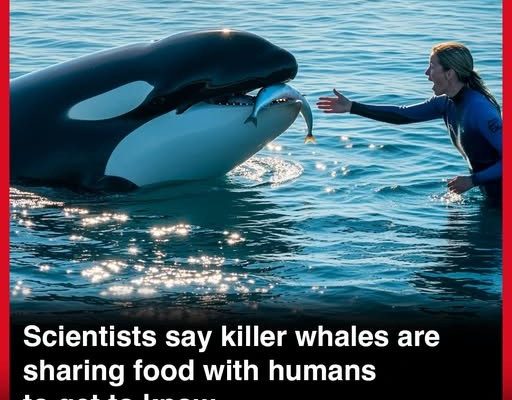An Ocean of Generosity? The Surprising Truth About Orcas Sharing Food with Humans
Imagine you’re on a whale-watching boat, the crisp sea air on your face, when a sleek, black-and-white fin slices through the water. An orca, one of the ocean’s most intelligent predators, approaches. But instead of just passing by, it slows, makes eye contact, and leaves a freshly caught fish floating near your boat—a gift.
It’s an incredible image, and over the past two decades, stories have bubbled up from places like California, New Zealand, Norway, and Patagonia of wild killer whales doing just that. Reports have claimed these magnificent creatures have offered everything from fish and seaweed to birds and even sea turtles to bewildered humans.
This idea has captured our collective imagination. Could these apex predators truly be extending a flipper of friendship, sharing their hard-won meals with us? It speaks to a deep-seated hope that we can connect with the wild on a profound, almost mythical level.
But before we add “receiving gifts from orcas” to our bucket lists, it’s crucial to dive a little deeper and separate the beautiful narrative from the scientific reality.
The Captivating Idea vs. The Scientific Record
While the idea of a generous orca is heartwarming, it’s important to note that there are no widespread, verified scientific reports of wild orcas systematically sharing food with humans. Marine biologists and orca researchers who have spent their lives studying these animals have not documented this as a regular, established behavior across different populations.
So, where do these stories come from? They likely stem from a combination of a few things:
-
Misinterpreted Behavior: An orca might drop its prey near a boat by accident while playing or teaching its young. A curious whale might bring an object (like seaweed) to the surface to investigate it near a boat, which could be mistaken for an offering.
-
Anecdotal Evidence: A single, isolated event can easily become a legend that grows with each retelling. While these personal experiences are powerful for those who witness them, they don’t represent a consistent, understood behavior.
-
Confusion with Other Species: Some species of dolphins (a close relative of orcas) have been known to occasionally leave “gifts” for humans, but even this behavior is rare and not fully understood by scientists.
The Real Generosity of Orcas
While they may not be stocking our pantries, the true “generosity” of killer whales is directed where it matters most for their survival: towards each other. Orca pods are built on one of the most sophisticated social structures in the animal kingdom, and sharing is at its core.
-
Sharing with Family: A successful hunt is a pod affair. The hunters will share their catch with the rest of the family, ensuring that the young, old, and sick are fed. In the Pacific Northwest, mother orcas are known to bite a salmon in half to share with their calves, teaching them how to eat.
-
Altruism and Empathy: There are documented cases of orcas caring for sick or injured pod members. They have been observed physically supporting a struggling individual at the surface so it can breathe. This level of empathy is a form of social and emotional generosity.
-
Sharing Knowledge: The most valuable thing orcas share is culture. Different pods have unique “dialects,” hunting techniques, and social traditions that are passed down through generations. The elders teach the young everything they need to know—a gift of knowledge more vital than any single fish.
A Real-Life Example of Orca-Human Cooperation
Perhaps the most famous instance of orca-human food-related interaction is the historic “Law of the Tongue” in Twofold Bay, Australia. For nearly a century, a pod of orcas actively cooperated with human whalers. The orcas would herd massive baleen whales into the bay, alert the whalers by slapping their tails on the water, and in return, were given the whale’s tongue and lips as a reward after the hunt.
This wasn’t a simple offering; it was a complex, mutually beneficial partnership. It shows that orcas are more than capable of forming intricate relationships with humans, but typically when there is a clear, tangible benefit for them.
The Greatest Gift
So, while you’re unlikely to be offered a salmon by a passing orca, the truth is even more awe-inspiring. These animals possess a deep intelligence, a complex culture, and a capacity for social bonding that rivals our own.
Perhaps the greatest gift they give us isn’t a fish, but a profound lesson in community, cooperation, and the enduring wonder of the natural world. They remind us that the ocean is not just a vast, empty space, but a vibrant home filled with thinking, feeling beings. And our role isn’t to wait for a gift from them, but to give them the gift of a clean, safe, and respected ocean to call home.

